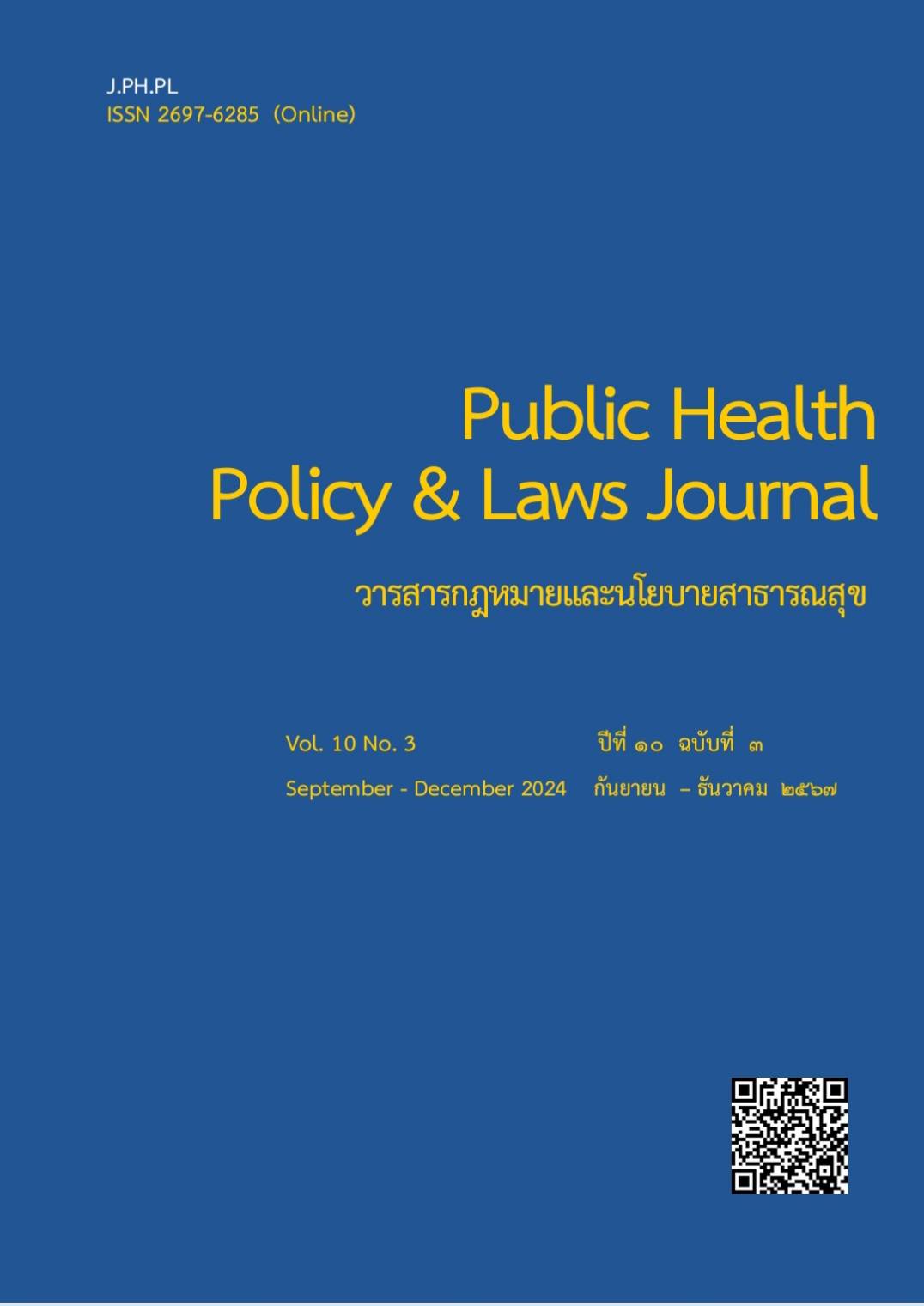Factors Influencing Technology Acceptance Among Village Health Volunteers in Kalasin Province: A Case Study on the Smart OSM Application
Keywords:
Technology Acceptance, Empowerment process, Community Health Communicators, Sustainable Development, Muslim Women Village Health Volunteers, Smart OSM ApplicationAbstract
This study aims to analyze the factors influencing the acceptance of the ‘Smart OSM Application’ by village health volunteers (VHVs), focusing on their professional activities. Employing a quantitative research approach, the study gathered data via a questionnaire featuring a 7-point Likert scale, targeting a population of 110 village health volunteers from Na Di Subdistrict, Yang Talat District, in Kalasin Province. The data analysis was conducted using Partial Least Squares Structural Equation Modeling (PLS-SEM). The findings indicated that perceived risk, performance expectancy, social influence, and eHealth literacy significantly positively affected the VHVs’ behavioral intention towards using the Smart OSM Application. Moreover, it was demonstrated that the VHVs’ behavioral intention had a positive correlation with their actual usage behavior of the application. The results of this study highlighted the importance of addressing security concerns, enhancing eHealth literacy skills, developing efficient applications, gaining social support, and promoting positive behavioral intentions among VHVs. The policy recommendations from this study include enhancing data security measures, providing continuous training to improve eHealth literacy, developing and improving the application’s functionality, promoting social influence by gaining support from key figures, and offering ongoing technical support. These recommendations aim to increase acceptance and sustainable use of the Smart OSM application in the future.
References
Bao, Y., Bao, Y., & Sheng, S. (2011). Motivating purchase of private brands: Effects of store image, product signatureness, and quality variation. Journal of Business Research, 64(2), 220-226. https://doi.org/10.1016/j.jbusres.2010.02.007
Breakwell, G. M. (2014). The psychology of risk. Cambridge University Press.
Dahri, N. A., Al-Rahmi, W. M., Almogren, A. S., Yahaya, N., Vighio, M. S., Al-maatuok, Q., ... & Al-Adwan, A. S. (2023). Acceptance of Mobile Learning Technology by Teachers: Influencing Mobile Self-Efficacy and 21st-Century Skills-Based Training. Sustainability, 15(11), 8514. https://doi.org/10.3390/su15118514
Department of Health Service Support. (2022, June 14). Village health volunteers. Department of Health Service Support. https://prgroup.hss.moph.go.th/article/1000
Gilstad, H. (2014). Toward a comprehensive model of eHealth literacy. Proceedings of the 2nd European Workshop on Practical Aspects of Health Informatics, 63-70.
Hfocus News Agency. (2022, July 4). The Department of Health Promotion invites village health volunteers to join in using the "SMART Village Health Volunteers" application using digital technology to control dengue fever in the community. Hfocus. https://www.hfocus.org/content/2022/07/25435
Kokab, S., Arif, M., & Qaisar, N. (2023). Factors affecting the university librarians’ use of social media technologies in Pakistan: A structural equation modelling approach. The Journal of Academic Librarianship, 49(3), 102719. https://doi.org/10.1016/j.acalib.2023.102719
Kongkid, A. (2022, October 2). Information technology in the digital era. Rabiangbanpansara. https://library.wu.ac.th/km/เทคโนโลยีสารสนเทศในยุค/
Lambert, S. I., Madi, M., Sopka, S., Lenes, A., Stange, H., Buszello, C. P., & Stephan, A. (2023). An integrative review on the acceptance of artificial intelligence among healthcare professionals in hospitals. NPJ Digital Medicine, 6(1), 111.https://doi.org/10.1038/s41746-023-00852-5
Lichtenstein, D.R., Ridgway, N.M., & Netemeyer, R.G. (1993). Price perceptions and consumer shopping behavior: a field study. Journal of Marketing Research, 30(2), 234-245. https://doi.org/10.1177/002224379303000208
Ministry of Public Health. (2018, June 29). Announcement regarding the right to receive sick pay for performing duties of village health volunteers, 2017. Royal Gazette, 135(Special Section 139 D), 16–18.
Public Health Support Division. (2023). Public health information system. Public Health Support Division. https://www.thaiphc.net/thaiphcweb/index.php?r=staticContent/show&id=1
Registration Management Office, Department of Provincial Administration. (2023). Official population statistics from civil registration (monthly). https://stat.bora.dopa.go.th/stat/statnew/statMONTH/statmonth/#/displayData
Salem, M. A., & Elshaer, I. A. (2023). Educators’ Utilizing One-Stop Mobile Learning Approach amid Global Health Emergencies: Do Technology Acceptance Determinants Matter?. Electronics, 12(2), 441. https://doi.org/10.3390/electronics12020441
Venkatesh, V., Morris, M.G., Davis, G.B., & Davis, F.D. (2003). User acceptance of information technology: Toward a unified view. MIS quarterly, 425-478. https://doi.org/10.2307/30036540
Zeithaml, V.A. (1988). Consumer perceptions of price, quality, and value: a means-end model and synthesis of evidence. Journal of Marketing, 52(3), 2-22. https://doi.org/10.1177/002224298805200302
Zhang, Q., Zhang, R., Lu, X., & Zhang, X. (2023). What drives the adoption of online health communities? An empirical study from patient-centric perspective. BMC Health Services Research, 23(1), 1-15. https://doi.org/10.1186/s12913-023-09469-6
Downloads
Published
How to Cite
Issue
Section
License
Disclaimer and Copyright Notice
The content and information presented in articles published in the Journal of Law and Public Health Policy represent the opinions and sole responsibility of the respective authors. The editorial board does not necessarily agree with or assume any responsibility for the views expressed.
All articles, data, content, images, and other materials published in the Journal of Law and Public Health Policy are the intellectual property of the journal. Any individual or organization wishing to reproduce, distribute, or otherwise use the entirety or any part of such materials must provide proper citation.





